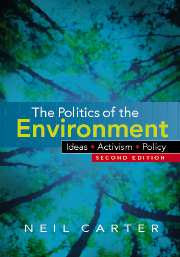Book contents
- Frontmatter
- Contents
- List of figures
- List of tables
- List of boxes
- Preface to the second edition
- Acknowledgements
- Abbreviations
- Glossary
- 1 Introduction
- PART 1 Theory: thinking about the environment
- PART 2 Parties and movements: getting from here to there
- PART 3 Environmental policy: achieving a sustainable society
- 7 The environment as a policy problem
- 8 Sustainable development and ecological modernisation
- 9 Global environmental politics
- 10 Globalisation, trade and the environment
- 11 Greening government
- 12 Policy instruments and implementation
- 13 Conclusion
- References
- Index
10 - Globalisation, trade and the environment
from PART 3 - Environmental policy: achieving a sustainable society
Published online by Cambridge University Press: 05 June 2012
- Frontmatter
- Contents
- List of figures
- List of tables
- List of boxes
- Preface to the second edition
- Acknowledgements
- Abbreviations
- Glossary
- 1 Introduction
- PART 1 Theory: thinking about the environment
- PART 2 Parties and movements: getting from here to there
- PART 3 Environmental policy: achieving a sustainable society
- 7 The environment as a policy problem
- 8 Sustainable development and ecological modernisation
- 9 Global environmental politics
- 10 Globalisation, trade and the environment
- 11 Greening government
- 12 Policy instruments and implementation
- 13 Conclusion
- References
- Index
Summary
Key issues
◗ What is the relationship between globalisation and the environment?
◗ Is free trade good for the environment?
◗ Does the WTO protect the environment?
◗ Is NAFTA a ‘green’ treaty?
◗ Why has the EU developed such an extensive and progressive body of environmental legislation?
The previous chapter examined the high politics of international environmental diplomacy – the negotiation of environmental treaties between nations – but it also introduced the international political economy perspective to help understand problems in implementing those treaties. This chapter focuses more squarely on the relationship between the global capitalist economy, specifically international trade, and the environment. The discussion is based on the assumption that globalisation has had a profound impact on the global economy over the last thirty years, although its nature and extent are widely debated. Whilst many of the processes of globalisation are hardly new – the expansion, extension and integration of international economies has been happening for several hundred years – as Lipschutz (2004) observes, ‘What is new is the scale and volume of capitalist expansion and the commodification of things never before exchanged in markets, such as genes, air pollution, and whale watching’ (p. 122). Thus economic globalisation has seen a massive growth in global trade, investment and finance, but the implications for the environment are hotly contested; some see globalisation as a positive development, whilst others regard it in profoundly negative terms. A similar debate surrounds the specific issue of free trade, which is a key driver of globalisation.
- Type
- Chapter
- Information
- The Politics of the EnvironmentIdeas, Activism, Policy, pp. 271 - 290Publisher: Cambridge University PressPrint publication year: 2007



